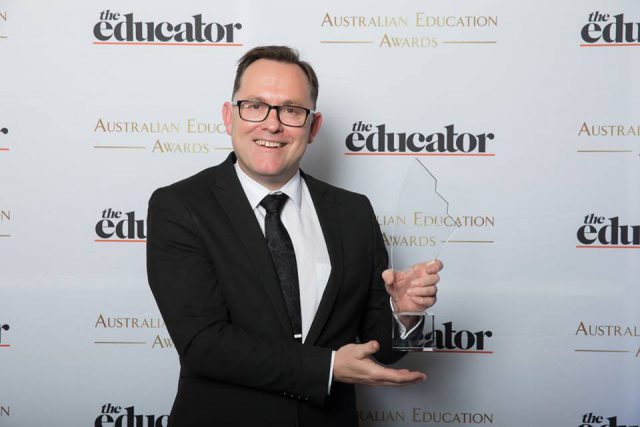
In 2017, Brad Gaynor became president of the Australian Catholic Primary Principals’ Association (ACPPA) – which represents Catholic primary school principals from more than 1,200 primary schools and 150 combined schools across Australia.
However, it is Gaynor’s effective leadership at Holy Spirit Primary School which earned him the accolade of Primary School Principal of the Year – Non-government at the inaugural Australian Education Awards in August.
The inaugural event was attended by a full house of over 500 of Australia’s education elite from across the country. Awards were presented in 24 categories recognising the work of the schools and individuals making their mark in the sector.
Gaynor said much of his success as a school leader is owed to his hard-working staff, who recognise that the job of principal requires many moving parts to function efficiently.
“In terms of leadership, a principal simply cannot do all these things single handily, let alone our core business of teaching and learning. It takes a team,” Gaynor told The Educator.
“Over the years, I have been gifted with many wonderful co-leaders and staff. Together we have been able to plan, debate, implement, trial, learn from mistakes and refine programs and initiatives.”
‘Differentiated leadership’
Gaynor describes his leadership style as “differentiated”.
“Firstly, it is about knowing yourself, your strengths and your limitations,” he explained.
“It is about knowing what you stand for, having high expectations, a sense of what’s right, and an ability to make decisions thoughtfully and for the good of all, not just yourself.”
Gaynor said that having integrity, being relational and being able to self-regulate allows principals to work more effectively with others.
“Differentiated leadership is about knowing and utilising the diverse learning styles, intelligences, motivations, skill levels and interests of staff,” he said.
“This takes relational skills and is distinguished depending on the relationship you have with the individual.
Gaynor said that by valuing the opinions, thoughts and talents of others, principals are more likely to create processes in the school that will motivate and engage staff and students.
“This creates a positive learning environment that leads to effective teaching and learning. In terms of positively influencing staff and students, it is about building positive relationships and being an encouraging role model,” he said.
‘Principals should be more visible’
Gaynor said that despite the complexities of being a principal, it is important for them to have a visible presence in the school and classrooms.
“I try to prioritise part of each day to visit a classroom or to touch base with a teacher who I may not have spoken with recently,” Gaynor said.
“This can be challenging to achieve some days, but by being relational allows you to be in tune with your community, to know what is happening and to know who may need some additional support.”
Gaynor said this also allows principals to see teaching and learning in action, know what resources are needed and makes them more available and accessible to staff and students.
“Being more reachable encourages students and staff to share their learning and to discuss any concerns they have. This builds that sense of community and positivity that is necessary to improve teaching and learning for all,” Gaynor said.
“By knowing your community, I believe a principal can have a much more positive influence on all aspects of the school.”
With students, says Gaynor, it about them knowing their principal and feeling comfortable with them.
“A student will achieve a great deal more of they know the principal, teachers and staff really care about them,” he said.


